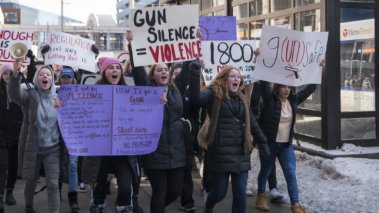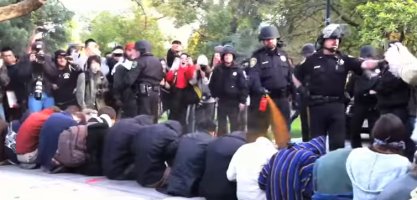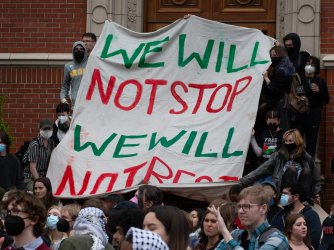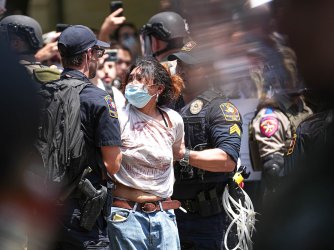Table of Contents
UPDATE: After Florida school shooting, ‘Worst Colleges for Free Speech’ promising high schoolers a right to protest

Update: FIRE has tallied the number of colleges and universities that have made statements supporting free speech, based on the list compiled by Chris Peterson, Massachusetts Institute of Technology assistant director of undergraduate admissions. Out of the schools in our Spotlight database that made statements on free speech, 61 have a “red light” speech code rating, 93 have a “yellow light” rating, and only 12 have a “green light” rating. Full results can be viewed here. FIRE stands ready to help any university with revising its speech codes.
In the wake of the Feb. 14 mass shooting at Florida’s Marjory Stoneman Douglas High School that left 17 dead and many more injured, school districts nationwide are warning students that they could face suspensions and other disciplinary measures for participating in walkouts and protests over guns and gun violence. Now, a number of colleges have released statements with an encouraging message for high school students who want to speak their mind on this issue: Engaging in peaceful protest won’t impact your college admission status.
A running tally of colleges that have made promises regarding free speech in light of these protests can be found here, in a list compiled by Massachusetts Institute of Technology Assistant Director of Undergraduate Admissions Chris Peterson.
While FIRE is encouraged by this approach from colleges across the country, the moment should also prompt reflection from these institutions about the extent to which they uphold the free speech rights of the students and faculty already on their campuses.
One striking example is DePaul University, a school that has wound up on FIRE’s annual 10 Worst Colleges for Free Speech list so many times that, this year, we had to designate a special category just for them: the first-ever Lifetime Censorship Award. Given DePaul’s abhorrent behavior on free speech issues for more than a decade, we were more than a little surprised when DePaul’s Associate Vice President of Enrollment Management and Marketing, Jon Boeckenstedt, took to Twitter last week to assure high school students about the school’s commitment to free expression:
Dear Students: If you participate in protests against gun violence and incur school discipline for walking out, you can rest assured you can report it to DePaul and we won't hold it against you. #ParklandStudentsSpeak
— Jon Boeckenstedt (@JonBoeckenstedt) February 22, 2018
And DePaul isn’t the only college from FIRE’s 10 Worst List making a similar promise. New York’s Fordham University also tweeted out an official statement promising all current students and applicants that they would be shielded from disciplinary measures should they choose to engage in “respectful” protest surrounding the gun violence debate:
The University stands with current Fordham students who demonstrate against this horrific violence. In addition, participation in peaceful demonstrations will have no adverse effect on admission decisions for students who apply to Fordham.https://t.co/ekrnQAcDfQ
— Fordham University (@FordhamNYC) February 26, 2018
But it was just last year that Fordham reprimanded one of its own students for participating in a rally protesting the university’s decision to refuse to recognize a chapter of Students for Justice in Palestine. The school is currently embroiled in a lawsuit over this decision. If that wasn’t enough, Fordham also currently earns FIRE's worst, “red light” speech code rating in our Spotlight Database for maintaining policies that clearly and substantially restrict free speech. Additionally, Fordham requires students to apply for permission from administrators before demonstrating.
Friend of FIRE Ken White and many others on Twitter were quick to point out the hypocrisy.
Colleges: it’s totally okay if you teens get in trouble for protesting, we support your free speech.
Teens: and you’ll still vigorously support our speech once we get to your colleges, right?
Colleges: um yeaahhhhh sure
— DontPeekJaredItsSecretHat (@Popehat) February 27, 2018
Michigan’s Albion College, also on FIRE’s 10 Worst list, released a statement echoing a similar pro-free-speech sentiment late yesterday afternoon affirming how fond of peaceful protest the college is:
Albion College stands firmly behind a student's choice to engage in peaceful protest. A prospective student's application for admission, and an admitted student's enrollment status, in no way will be impacted by that choice.
— Albion College (@albioncollege) February 27, 2018
Unfortunately, Albion is also fond of dragging its own students through months-long disciplinary hearings despite promising students the right to free speech, as is the case with Albion student Alexander Tokie. Tokie was subjected to a prolonged investigation for allegedly violating Albion’s policy against the “[u]se of, or threatened use of, physical force or violence” after he made a passing joke in an email about using “liberal tears” to clean his handgun and acquiring “ANTIFA and ISIS hunting permits.”
Then there’s the University of California at Davis, which released a statement a few days ago affirming its commitment to freedom of expression and peaceful protests:
We encourage our community to exercise freedom of expression and engage in meaningful and respectful dialogue. Students who participate in peaceful protests will not jeopardize their admission to UC Davis.
While UC Davis hasn’t been on our 10 Worst list in recent years, who could forget the incident of Nov. 2011 when a UC Davis campus police officer strolled past a group of peaceful protestors staging a sit-in and hosed them down with pepper spray as if he were watering his plants?

In 2016, following this abhorrent behavior by campus police, UC Davis paid outside consultants $175,000 to “scrub the Internet of negative online postings following the November 2011 pepper-spraying of students and to improve the reputations” of both the university and then-chancellor Linda Katehi. (Katehi resigned amid an ethics probe into this incident and other questionable behavior, but still works at the school as a professor.)
Since the tragic incident at Marjory Stoneman Douglas High School, seven schools that made appearances on our 2018 10 Worst Colleges for Free Speech list have released similar statements affirming their commitments to freedom of speech, including Harvard University, Texas State University, Northwestern University, and the University of California, Berkeley, in addition to DePaul, Albion, and Fordham, mentioned above.
Statements like these are promising and reflect how administrators should be reacting to students who exercise their rights to free speech. But if administrators truly care about protecting students’ rights, they need to stand by these principles every day — not only when their public relations staff suggest a well-timed tweet to garner good press.
That means changing policies that students have to live with on their own campuses, policies that often lead to the punishment of student protesters. It’s all well and good that high schoolers believe a university will protect their right to expression when they protest gun violence at their high schools. But will those same universities protect that student’s right to protest on other, less convenient issues when they arrive on campus?
If you’re curious about how your college or university stacks up when it comes to free speech, you can check out FIRE’s Spotlight Database and search for your school to see its rating on free speech and due process. As always, FIRE stands ready to assist colleges and universities in reforming restrictive policies. All they need to do is ask.
In need of First Amendment resources for teachers? The Foundation for Individual Rights in Education has you covered. Our "First Things First" First Amendment textbook for college undergraduates explores the fundamentals of modern American free speech law. Meanwhile, our K-12 First Amendment curriculum modules help educators enrich and supplement their existing instruction on First Amendment and freedom of expression issues in middle and high school classrooms. Explore thefire.org for even more First Amendment educational resources.
Recent Articles
FIRE’s award-winning Newsdesk covers the free speech news you need to stay informed.

Trump v. Merchan — Testing the limits of judicial contempt in criminal cases: 12 questions . . . and a just-released appellate ruling — First Amendment News 423

Majority of college students support Israel/Gaza campus protests, 1 in 10 actually participate in them

Students more likely to face arrest on campuses with poor free speech climates
